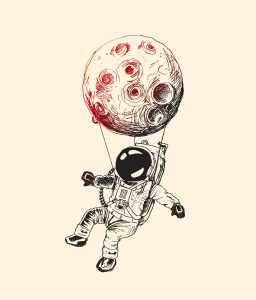The winners of the Hugo Awards will be announced next month and with the Nebula Award winners having been announced in May (two of the biggest awards in science fiction), let's take this moment in between to think about the future in literature and what it actually means to write and think about the future.
When we think about fiction and the future, there are two sub-genres that immediately spring to mind: dystopian and utopian. Most people will be familiar with dystopia; arguably the most popular form of science-fiction that there is. From Atwood's The Handmaid's Tale, The Walking Dead, or the classics of Nineteen Eighty-Four, Brave New World, and Logan's Run, the idea of dystopia appear to be firmly entrenched in Western cultures' collective imaginary. We all have different ideas of what a dystopia might look like, but put simply, it is an imagining of an unpleasant future that could occur through an apocalyptic event, the rise of widespread tyranny, or simply the break down of civil society.
 The counterpoint to this bleak storytelling of a world gone to the dogs is utopian fiction. Many people will, as with dystopia, have different ideas of what utopia looks like. So, in this instance I am going to use the pragmatic definition of utopia put forward by Hugo and Nebula award winning author Kim Stanley Robinson: utopia is imagining the best possible outcome given where we are now. What I like about this understanding of utopia is that it doesn't mystify utopia into religious sentimentality but places it firmly into the realm of possibility.
The counterpoint to this bleak storytelling of a world gone to the dogs is utopian fiction. Many people will, as with dystopia, have different ideas of what utopia looks like. So, in this instance I am going to use the pragmatic definition of utopia put forward by Hugo and Nebula award winning author Kim Stanley Robinson: utopia is imagining the best possible outcome given where we are now. What I like about this understanding of utopia is that it doesn't mystify utopia into religious sentimentality but places it firmly into the realm of possibility.
Take Robinison's novel New York 2140 (that has been nominated for the 2018 Hugo Award for best novel) for example. Here we experience a New York that as endeavoured to survive and re-create itself in the wake of catastrophic climate change as the innovation of adaptability of humanity leads to a future despite of the crisis it found itself in. Robinson's Nebula award winning novel 2312 also highlights the redeemable aspects of humankind as they work together to try alleviate humanity's suffering and begin to recreate Earth into something resembling its former self.
Utopian fiction is not about the absence of conflict - no one would want to read or watch a story with no conflict - but the conflict is about the actions taken to prevent the fall into dystopia. Isaac Asimov's Foundation series is a fantastic example of such utopian thinking as the protagonists work to prevent a galaxy wide collapse into unprecedented galactic barbarism. Here, the utopian thinking is about creating a future for humankind that is free of insecurity and suffering.
Other examples of utopian fiction include Ursula Le Guin's The Dispossesed and Arthur C. Clarke's Childhood's End.
So take a moment, and read about the future. Not the future in which everything is awful and the only thing humanity can hope for is survival, but a future in which humanity has a chance to thrive and flourish as it overcomes all the obstacles that could limit it from having a meaningful future existence.
And you might want to try the best novel finalists for this year's Hugo Awards and the winners of this year's Nebula Awards.




Add a comment to: Let’s think about the future